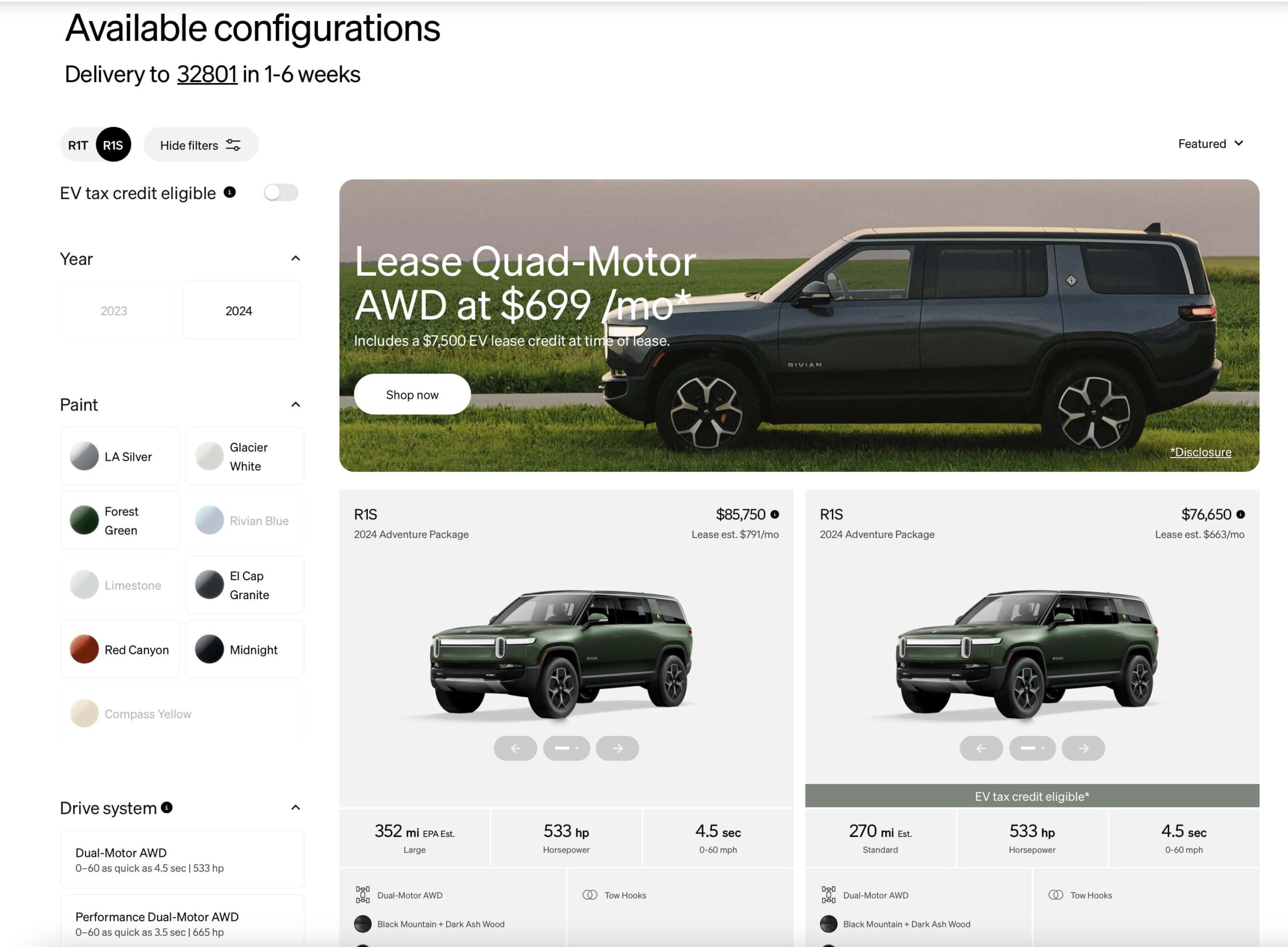The future of Tesla’s Model X in the face of the success of the Rivian R1S
[ad_1]
Elon Musk recently pointed out that production of the Tesla Model S and Model X continues mainly for sentimental reasons. However, with the Rivian R1S outselling the Model X almost twice in the first quarter, questions are emerging about the latter’s long-term viability. This article explores the potential future of Model X and strategies Tesla could adopt to revitalize its iconic model.
Luxury Electric Vehicle Market Background
The luxury electric SUV market is booming. Rivian, with its R1S model, has made a significant leap in brand recognition and customer satisfaction, as highlighted by Kevin Melnuk on Twitter. This rise of Rivian contrasts with the stagnant sales of Tesla’s Model X, which once dominated this segment.
Model X Challenge Analysis
Decline in sales
Increased competition in the luxury electric SUV sector, particularly from entrants like the Rivian R1S, highlights the challenges the Model X faces. Although Model X enjoys strong brand awareness and a loyal customer base, its sales are not growing at the same rate as its competitors.
High production cost
The Model X is one of the most expensive vehicles to produce in Tesla’s lineup, which could affect its long-term profitability. The question therefore arises as to whether maintaining this model for mainly sentimental reasons is financially viable for Tesla.
Comparison table between the Rivian R1S and the Tesla Model
Here is a comparison table that highlights the main features and differences between the Tesla Model X and the Rivian R1S, two luxury electric SUVs.
| Characteristic | Tesla Model | Rivian R1S |
|---|---|---|
| Starting price | About $120,000 | About $78,000 |
| Autonomy | Up to 560 km (depending on version) | Up to 507 km (depending on battery) |
| Performance | Acceleration from 0 to 100 km/h in 2.6 seconds (Plaid) | Acceleration from 0 to 100 km/h in 3 seconds |
| Towing capacity | Up to 2,268 kg | Up to 3,500 kg |
| Number of seats | Up to 7 seats | Up to 7 seats |
| Autonomous driving technology | Basic Autopilot included, option for full autonomous driving capability | Level 2 autopilot (driver assistance system) |
| Interior | 17-inch central screen, high-end materials | 15.6-inch touchscreen, interior focused on durability |
| Storage | Total volume of 2,492 liters | Total volume of 2,065 liters |
| Special features | Falcon Wing Doors, Advanced HEPA Filtering System | Robust design, geared towards outdoor activities |
Analysis
- Price and value: The Rivian R1S offers a more affordable base price than the Model X, making the R1S potentially more appealing to a wider audience.
- Autonomy and performance: The Model X Plaid offers superior speed performance but also costs more, while the Rivian R1S offers competitive range at a lower price.
- Practical abilities: The Rivian R1S outperforms the Model X in towing capacity, which can be a major plus for users with specific transportation and outdoor activity needs.
- Technology: Tesla is known for its advances in autonomous driving technology, although Rivian’s system offers very effective safety and driver assistance features.
- Interior and comfort: Tesla uses high-quality materials and advanced technologies for the interior, while Rivian emphasizes durability and adaptability for outdoor adventures.
Future outlook for Model X
Refreshment possibilities
To maintain the Model X’s appeal, Tesla could consider a substantial update of this model. This could include technological improvements, such as an increase in range and more advanced autonomous driving features, or even an overhauled interior and exterior design.
Strategic realignment
Tesla could also rethink its strategy for the Model X, positioning it as a niche product aimed at consumers wanting to own a vehicle symbolic of Tesla’s innovation. This approach could make it possible to maintain profitable production, while meeting the expectations of a specific market segment.
When shopping for an electric SUV like the Tesla Model X or Rivian R1S, it’s essential to consider the charging options. These vehicles stand out not only for their performance and range, but also for their efficiency and charging flexibility, crucial factors in optimizing your electric driving experience.
Charging options for Tesla Model
Model At home, installing a Tesla Wall Connector allows a complete recharge in just a few hours, depending on the capacity of the domestic electrical circuit.
Charging options for the Rivian R1S
The Rivian R1S is compatible with Level 3 DC charging stations, enabling Tesla-like fast charging on public networks. For home charging, Rivian also offers custom solutions that, while requiring professional installation, provide convenient nighttime charging for full battery life every morning.
Importance of a suitable charging infrastructure
Whether you opt for a Tesla Model X or a Rivian R1S, access to fast and convenient charging at home or in the office is essential. Installing adequate charging infrastructure not only increases convenience but also ensures that you get the most out of your electric vehicle without relying exclusively on public charging points.
Request for quote for the installation of a charging infrastructure
If you are considering purchasing an electric vehicle and would like to prepare your home or business for this transition, we invite you to complete our quote request form. Our experts will help you choose the charging option best suited to your specific needs, ensuring seamless integration of your new vehicle into your daily life.
Do you want to install a charging station at the best price?
Conclusion
The future of Model X in an increasingly competitive market is uncertain. However, with strategic adjustments and product updates, Tesla can potentially revitalize interest in this iconic model. The decision to continue producing Model X will depend on Tesla’s ability to balance sentimental considerations with business and technological imperatives in an ever-changing market environment.
[ad_2]
